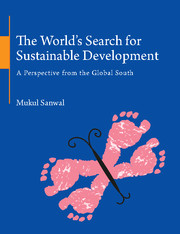Book contents
- Frontmatter
- Dedication
- Contents
- Preface
- Acknowledgments
- Abbreviations
- INTRODUCTION
- 1 Social Dimension of Sustainability
- CONSUMPTION IN AN UNEQUAL WORLD: FRAMING INTERNATIONAL COOPERATION
- CLIMATE POLICY: GLOBAL TO NATIONAL
- SUSTAINABLE DEVELOPMENT: NATIONAL TO GLOBAL
- CONSUMPTION IN A MORE EQUAL WORLD: SHAPING SOCIETAL FUNCTIONS
- GEOPOLITICS TO GEOECONOMICS: RURAL–URBAN DIVIDE, RATHER THAN BETWEEN COUNTRIES
- THE ASIAN CENTURY
- Index
CLIMATE POLICY: GLOBAL TO NATIONAL
Published online by Cambridge University Press: 18 December 2015
- Frontmatter
- Dedication
- Contents
- Preface
- Acknowledgments
- Abbreviations
- INTRODUCTION
- 1 Social Dimension of Sustainability
- CONSUMPTION IN AN UNEQUAL WORLD: FRAMING INTERNATIONAL COOPERATION
- CLIMATE POLICY: GLOBAL TO NATIONAL
- SUSTAINABLE DEVELOPMENT: NATIONAL TO GLOBAL
- CONSUMPTION IN A MORE EQUAL WORLD: SHAPING SOCIETAL FUNCTIONS
- GEOPOLITICS TO GEOECONOMICS: RURAL–URBAN DIVIDE, RATHER THAN BETWEEN COUNTRIES
- THE ASIAN CENTURY
- Index
Summary
‘Change in the Earth's climate and its adverse effects are a common concern of humankind’
United Nations Framework Convention on Climate Change, 1992.
‘The social sciences must help to fundamentally reframe climate and global environmental change from a physical into a social problem’.
ISSC/UNESCO, 2013, World Social Science Report 2013: Changing Global Environments. OECD Publishing and UNESCO Publishing, Paris.
‘Behavior, lifestyle and culture have a considerable influence on energy use and associated emissions … in particular when complementing technological and structural change. Emissions can be substantially lowered through changes in consumption patterns, adoption of energy savings measures, dietary change and reduction in food wastes. … outcomes seen as equitable can lead to more effective cooperation.’
IPCC, Fifth Assessment Synthesis Report, 2014.
‘Choices made in cities today about long lived urban infrastructure will determine the extent and impact of climate change, our ability to achieve emission reductions and our capacity to adapt to changing circumstances’.
International Energy Agency, ‘Cities and Climate Change: Policy Perspectives – National governments enabling local action’, September 2014
“… the Presidents of China and the United States announced their respective post-2020 actions on climate change, recognizing that these actions are part of the longer range effort to transition to low-carbon economies, mindful of the global temperature goal of 2°C. The United States intends to achieve an economy-wide target of reducing its emissions by 26%–28% below its 2005 level in 2025 and to make best efforts to reduce its emissions by 28%. China intends to achieve the peaking of CO2 emissions around 2030 and to make best efforts to peak early and intends to increase the share of non-fossil fuels in primary energy consumption to around 20% by 2030. Both sides intend to continue to work to increase ambition over time …: In response to growing urbanization and increasingly significant greenhouse gas emissions from cities and recognizing the potential for local leaders to undertake significant climate action, China and the United States will establish a new initiative on Climate-Smart/Low-Carbon Cities…”
China-US Joint Announcement on Climate Change Beijing, China, 12 November 2014
- Type
- Chapter
- Information
- The World's Search for Sustainable DevelopmentA Perspective from the Global South, pp. 111 - 112Publisher: Cambridge University PressPrint publication year: 2015



